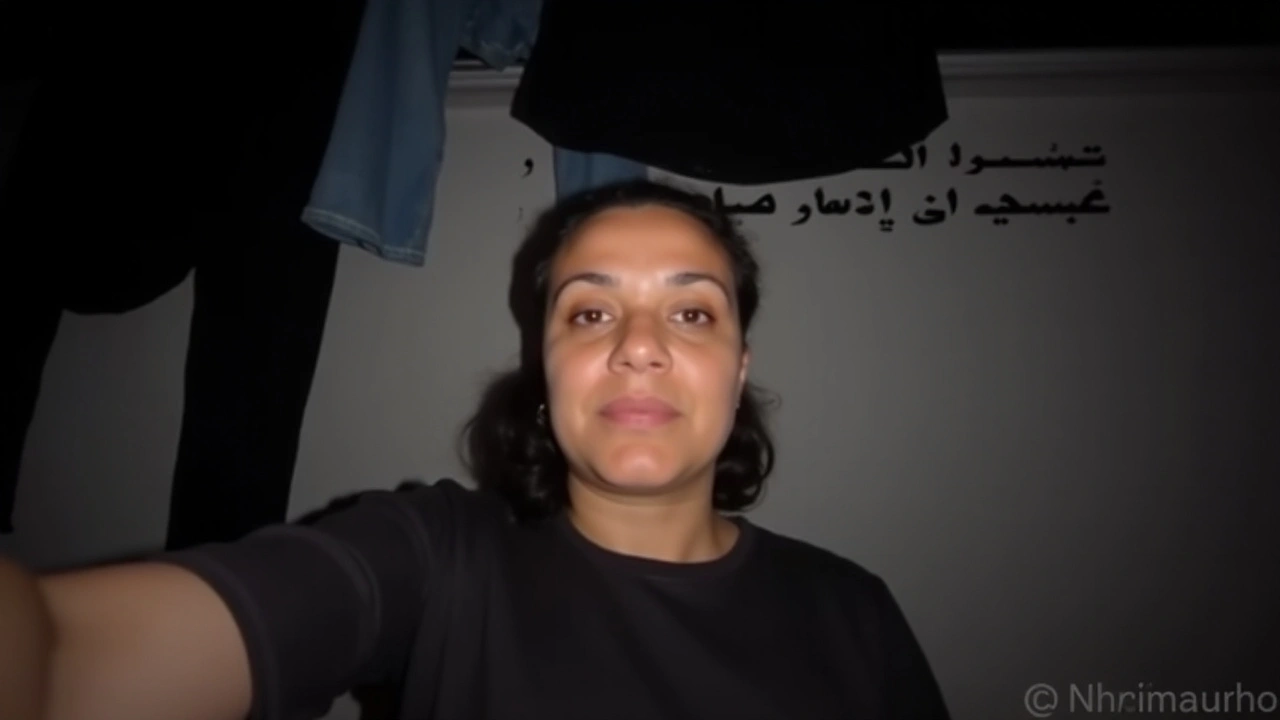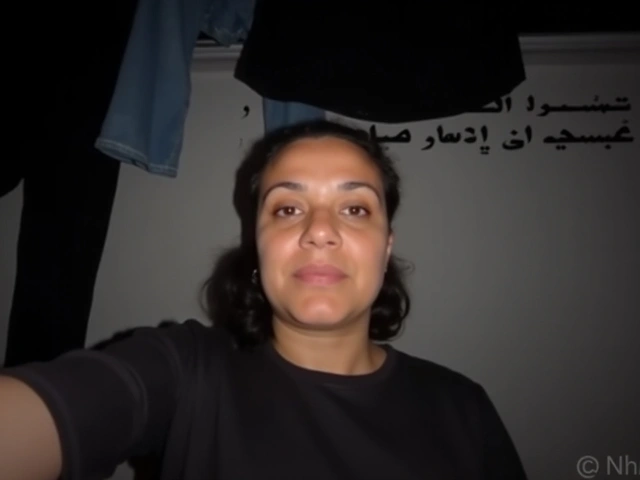CAIR Denounces Attempts to Silence Emmy-Nominated Gaza Documentary Filmmaker Bisan Owda
The Council on American-Islamic Relations (CAIR) has expressed strong condemnation over efforts to silence Bisan Owda, a 25-year-old Palestinian journalist from Gaza, who has been nominated for an Emmy Award. Owda's documentary, titled 'It's Bisan From Gaza and I'm Still Alive,' presents a poignant chronicle of life during Israeli attacks in Gaza, capturing her personal experiences and the brutal realities faced by civilians in the region.
Documentary in the Spotlight
The controversy surrounding Owda's nomination emerged following an open letter issued by the Creative Community for Peace (CCFP), a pro-Israel nonprofit organization. The letter urged the National Academy of Television Arts and Sciences (NATAS) to retract Owda's Emmy nomination, alleging her association with the Popular Front for the Liberation of Palestine (PFLP), an organization considered a terrorist group by several Western nations, including the United States. Despite these serious allegations, NATAS President Adam Sharp defended the nomination, stating that thorough scrutiny revealed no evidence of Owda's current involvement with the PFLP. Sharp underlined NATAS' commitment to recognizing diverse perspectives in journalism, noting the historical importance of controversial works in fostering a holistic understanding of global issues.
CAIR's Stand Against Silencing Voices
CAIR voiced its disapproval of attempts to silence Owda, describing such actions as an attempt to stifle crucial viewpoints on the Gaza conflict and its impact on innocent civilians. The organization highlighted a disturbing uptick in anti-Muslim and anti-Palestinian hate incidents, reporting 3,578 complaints during the last three months of 2023—a dramatic 178% increase compared to the previous year. These figures, CAIR contends, symbolize the growing bigotry faced by Muslim, Arab-American, and Palestinian communities.
Defending Press Freedom
Owda's employer, Al Jazeera, has staunchly supported her, dismissing the CCFP's allegations as baseless and an explicit attempt to silence her indispensable reporting from Gaza. This support underscores the importance of press freedom and the need to protect journalists who bring critical issues to the forefront, often at great personal risk.
The Broader Implications
CAIR's National Executive Director Nihad Awad and Research and Advocacy Director Corey Saylor emphasized the resilience of communities facing such bigotry and reiterated the organization's unwavering commitment to seeking justice for Palestine. The controversy not only brings attention to Owda's documentary but also raises broader questions about the freedom of expression and the lengths to which detractors are willing to go to suppress dissenting voices. Awad pointed out the essential role that such documentaries play in shedding light on underreported crises and fostering global awareness.
Importance of Diverse Perspectives
Concerns over attempts to revoke Owda's nomination also reflect the contentious nature of the international dialogue on Gaza and the need for discernment in assessing such nominations. While the accusations against Owda remain unsubstantiated, the fervent campaign against her underscores the challenges faced by journalists working in conflict zones and the fraught terrain of public opinion and media representation.
A Call for Action
CAIR's statement also served as a call to action, urging communities and advocacy groups to rally against the suppression of voices that highlight humanitarian crises. The organization's emphasis on the rise of hate incidents serves as a sobering reminder of the hostile environment faced by many reporters and activists. The report points out that these attacks are not just isolated events but part of a broader pattern of discrimination and hostility that requires urgent attention and concerted action.
The Role of Journalism
By standing with Owda, CAIR and other organizations reinforce the critical role that journalism plays in documenting human suffering and advocating for justice. Whether through documentaries, written reports, or other media, these efforts serve as vital tools for educating the public and holding power to account. The situation emphasizes the need for vigilance in protecting the rights of those who risk much to tell difficult truths.
Conclusion
As the controversy surrounding Bisan Owda's Emmy nomination continues, it serves as a powerful reminder of the intersections between media, politics, and human rights. At its heart, this debate is about more than just an award; it is about the right to tell one's story and the imperative to listen and learn from the experiences of others. CAIR's condemnation of efforts to silence Owda not only defends one journalist's work but also champions a broader commitment to justice, transparency, and the free flow of information in an increasingly complex world.



Comments
It's great to see CAIR standing up for journalists like Bisan.
Honestly, this whole drama feels like a blockbuster script written by someone who thinks every conflict is a Hollywood plot twist. Bisan's courage is undeniable, but the media circus around her nomination is just another layer of sensationalism, and it kinda reeks of bias from both sides. People love to paint her as a martyr or a villain depending on their agenda, and that’s not helpful for any real conversation. The fact that CAIR jumped in like a knight in shining armor shows how polarized our discourse has become. Some say it’s about press freedom, others claim it’s about terrorist ties-both extremes ignore the nuanced reality on the ground. While NATAS says they did their homework, the public still clings to conspiracy theories like they’re reading the latest gossip column. It’s wild how quickly a documentary about surviving a war becomes a pawn in geopolitical chess. Let’s not forget, Bisan herself is just a journalist trying to tell a story, not a political operative pulling strings behind the scenes. This whole saga highlights how quickly facts get twisted in the age of social media, where everyone’s got an opinion before they’ve even read the article. I’m not saying we should ignore the allegations, but we also shouldn’t jump to condemning an artist for something they may not even be involved in. The rise in hate incidents that CAIR mentions is alarming, and it paints a grim picture of how intolerance spreads. Yet, the biggest irony is that calling out that intolerance is itself being labeled as extremist by some. So, while we celebrate the Emmy nod as a win for documentary storytelling, we must also stay critical of the narratives being forced onto it. In the end, the truth probably sits somewhere in the middle, and that’s the space where real dialogue should happen, not in the echo chambers of either side. Keep your eyes open, folks, and don’t let the noise drown out the human stories that matter.
Looks like another case where a good piece of work gets caught in a political tug‑of‑war. The doc clearly shows civilian suffering, and that deserves recognition without the extra drama. Still, it’s worth watching how the narrative evolves as more details emerge.
While some cheer for Bisan’s nomination, let’s not forget the underlying security concerns. Supporting a filmmaker who may have ties to extremist groups, however tenuous, can set a dangerous precedent. We must ask whether the accolades are blind to the bigger picture of propaganda.
Whoa!!! Hold up!!! The narrative you just spun is riddled with assumptions!!! No concrete evidence was ever presented!!! So jumping to conclusions is not only premature but also irresponsible!!! Let's stick to verified facts before painting anyone with a broad brush!!!
Every time I see a story like this, I can’t help but feel the weight of history pressing down on our shoulders. The pain, the resilience, the raw humanity-Bisan captures it all with a lens that refuses to look away. It’s not just a documentary; it’s a mirror reflecting the world’s conscience, urging us to see beyond headlines and statistics.
Great point about how stories shape perceptions. Keeping it simple: we need more voices like Bisan’s to remind us of the human side behind every conflict.
👍 Keeping the conversation positive and focused on the impact of the film. 🌍
Truth is a layered tapestry, woven from threads of pain and hope; we must unravel it gently.
From a data standpoint, the rise in hate incidents correlates with media coverage spikes. Ignoring the statistics does not solve the problem.
Everyone, let’s remember that supporting journalists is about protecting the free flow of information, not about endorsing any political stance. By encouraging diverse narratives, we strengthen our collective understanding and foster a more informed society.
Exactly! 🎯 We need to champion the work without turning it into a battlefield for ideologies. 😊